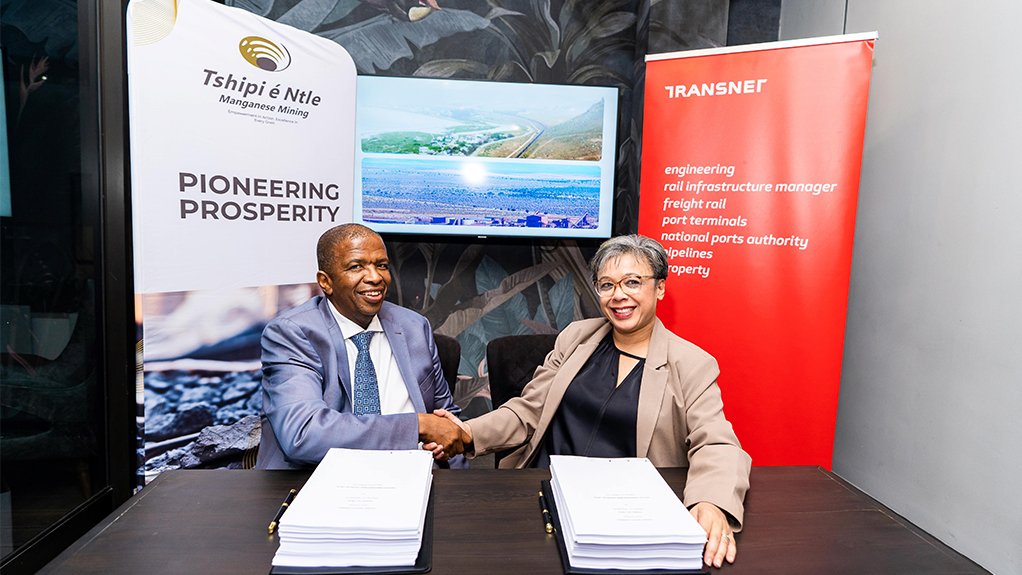JOHANNESBURG (miningweekly.com) – State-owned rail company Transnet on Wednesday reported yet another ten-year third-phase Manganese Export Capacity Allocation (MECA3) agreement, this time with the Tshipi é Ntle manganese mining company, and once again in South Africa’s well-endowed Northern Cape.
Tshipi é Ntle has Tshipi Borwa, a shallow opencast mine with an integrated ore processing plant, which is located in the 400 km2 Kalahari manganese field, northwest of Kathu.
MECA3 is the programme through which Transnet allocates rail and port export volume capacity to manganese producers to secure South Africa’s position in the supply chain, while opening up opportunities for economic development and industrial growth.
In July, Transnet signed a MECA3 of the same duration with United Manganese of Kalahari and then last month repeated another with Hotazel Manganese Mines, a joint venture operated by a wholly-owned subsidiary of the Sydney- and Johannesburg-listed South32, which has the Wessels and Mamatwan manganese mines, also in the Northern Cape’s Kalahari basin.
Through the latest agreement, Tshipi é Ntle is provided with rail and port allocation certainty that enables Tshipi Borwa to continue meeting rising global demand for manganese as part of a contract that incorporates joint commitment to supporting South Africa’s competitiveness.
Transnet Group CE Michelle Phillips described the agreement with Tshipi é Ntle as one that demonstrates the value of aligning logistics and mining strategies to secure sustainable export flows.
“This long-term agreement will not only facilitate consistent delivery to international customers but also strengthen confidence in South Africa’s ability to serve global markets,” Phillips added in a media release to Mining Weekly.
Tshipi é Ntle, which means “beautiful steel” in the local Tswana language, emphasises the key role that manganese plays in strengthening, hardening and providing wear resistance to steel.
While steelmaking represents the overwhelming primary demand, manganese also has applications in batteries as well as in glassmaking and ceramics. In the human body, manganese activates enzymes involved in metabolism and is consumed for bone health.
The partnership aspect of the agreement was emphasised by Tshipi é Ntle CE Ezekiel Lotlhare, who noted that it was a partnership that had underpinned the decade-plus journey of Tshipi é Ntle.
Lotlhare views it as something that ensures that Tshipi é Ntle remains on a stable logistics platform in support of the company’s growth ambitions while continuing to create value for employees, shareholders and host communities.
COAL RAIL AGREEMENT
Last week, Transnet signed a coal rail agreement with Exxaro that includes the making of a specific contribution towards the turnaround plan for Exxaro’s Leeuwpan coal mine in Mpumalanga.
Interestingly, Exxaro is in the process of also entering the manganese mining and marketing field through the purchase of the shareholdings in Tshipi é Ntle of Ntsimbintle Holdings and OM Holdings.
The transaction is expected to be completed in the first quarter of next year. For a purchase consideration of R11.67-billion, rising to R14.68-billion with tag-along rights and escalations, the Johannesburg-listed Exxaro will acquire 60.1% effective ownership of Tshipi é Ntle’s Tshipi Borwa mine, 50.1% of the marketing rights, 19.99% of Jupiter Mines, 100% of Ntsimbintle Marketing and Trading, 51% of Mokala Manganese, and 9% of Hotazel.
Over-and-above all of the agreements being signed by Transnet, South Africa’s Transport Minister Barbara Creecy is entering into contract negotiations with 11 private train operating companies to enable them to gain access to the State-owned rail network.
EMAIL THIS ARTICLE SAVE THIS ARTICLE ARTICLE ENQUIRY FEEDBACK
To subscribe email subscriptions@creamermedia.co.za or click here
To advertise email advertising@creamermedia.co.za or click here











